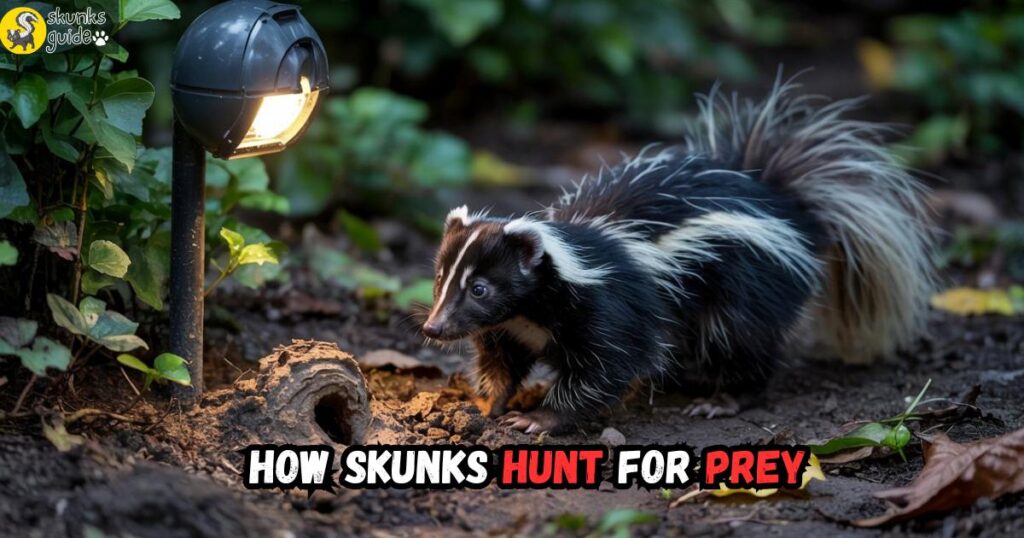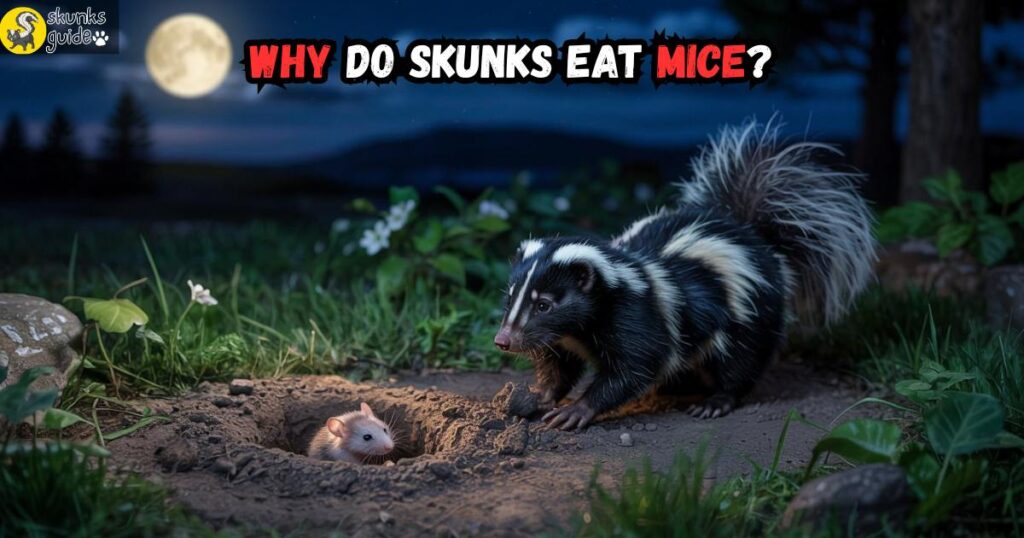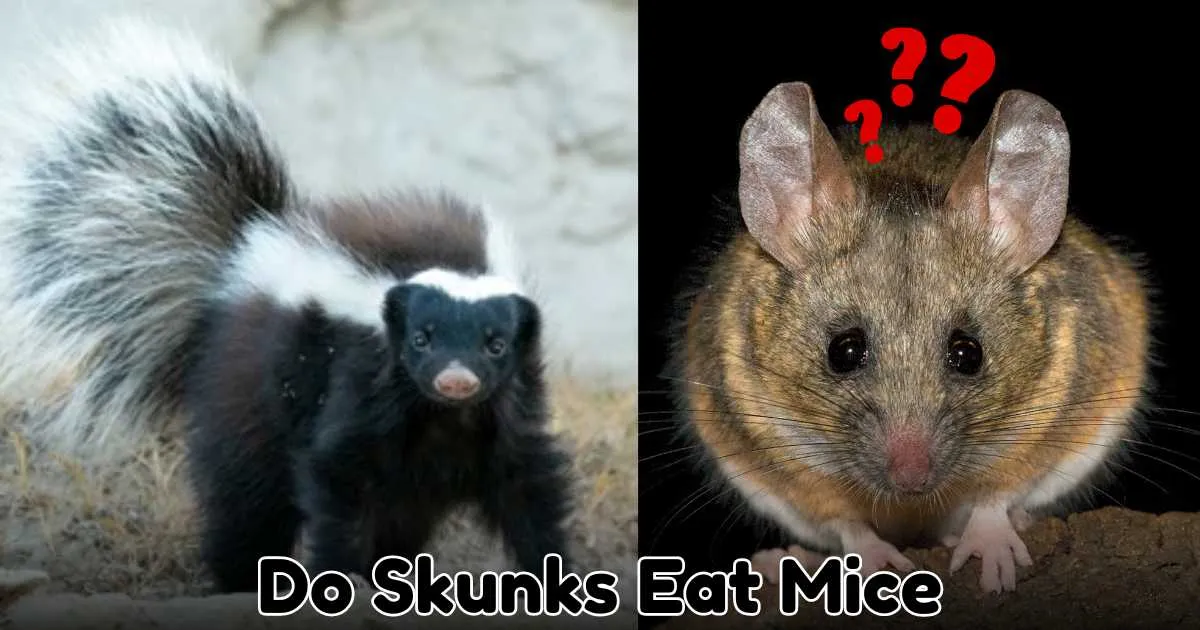Do Skunks Eat Mice? Surprising Diet Facts!
Last updated on June 26th, 2025 at 12:20 pm
As a devoted skunk owner and wildlife enthusiast, I’ve often been asked about the dietary habits of these fascinating creatures. One question that frequently arises is: Do skunks eat mice?
The short answer is yes! Skunks are opportunistic omnivores, meaning they’ll eat whatever is readily available, and that includes mice. Understanding their role as natural pest controllers sheds light on their importance in maintaining ecological balance.
In this article, we’ll explore why skunks eat mice, how they hunt, and how this behavior benefits the ecosystem. Whether you’re simply curious about skunks or managing mice in your backyard, you’ll find this guide both informative and engaging.
What Do Skunks Eat?
Skunks are incredibly versatile eaters, thriving on a diet that changes with the seasons and availability of food. Their diet includes a mix of animal protein and plant material, making them omnivores. Here’s a closer look at their typical menu:
Animal-Based Foods
- Insects (beetles, grasshoppers, crickets)
- Small rodents (mice, voles, and shrews)
- Birds and eggs
- Reptiles and amphibians (frogs, lizards, and small snakes)
Plant-Based Foods
- Fruits (berries, apples, cherries)
- Vegetables (corn, peas, carrots)
- Seeds and nuts
- Grasses and fungi
Skunks are opportunistic eaters, which means they’ll adapt their diet to whatever is abundant in their environment. While mice aren’t their primary food source, skunks readily eat them when the opportunity arises.
Do Skunks Eat Mice?
Yes, skunks eat mice! In fact, small rodents like mice and voles make up an essential part of their diet, especially during the winter months when insects and fruits are scarce. Skunks are natural pest controllers, helping to keep rodent populations in check.
How Do Skunks Hunt Mice?

Skunks aren’t built for speed or stealth like cats or foxes, but they have their own unique hunting methods:
- Keen Sense of Smell: Skunks rely on their excellent sense of smell to locate mice nests or burrows.
- Digging Skills: With their strong claws, skunks can dig into the ground to access hidden mice or their young.
- Ambush Techniques: Skunks often hunt at night, when mice are most active. They use the element of surprise to catch their prey.
While they aren’t active hunters of mice, skunks are opportunistic and will seize the chance to eat a mouse if it’s easy to catch.
Why Do Skunks Eat Mice?

Skunks eat mice because they are an excellent source of protein and fat, which are crucial for energy and survival. Mice provide the nutrients skunks need to thrive, especially during colder months when other food sources are limited.
Benefits of Mice in a Skunk’s Diet
- Rich in Protein: Supports muscle growth and repair.
- High in Fat: Provides energy, especially during winter.
- Readily Available: Mice are abundant in many environments, making them a reliable food source.
The Role of Skunks as Natural Pest Controllers
One of the most significant benefits of skunks eating mice is their role in pest control. Skunks help manage rodent populations, which can prevent the spread of diseases and reduce damage to crops and property.
Skunks vs. Mice: Nature’s Balance
Their predation on mice supports a balanced ecosystem, benefiting both humans and wildlife.
Skunks control mice populations naturally, reducing the need for harmful rodenticides.
By preying on mice, skunks help protect gardens, farms, and homes from infestations.
Skunks and Urban Environments
In urban and suburban areas, skunks adapt their foraging habits to include human-related food sources, such as garbage or pet food. However, they still hunt mice, especially if there’s an infestation nearby.
Signs of Skunks Hunting Mice in Your Yard
- Dug-up patches of soil: Skunks dig for insects and mice nests.
- Reduced rodent activity: Skunks’ presence often coincides with fewer mice.
- Nighttime foraging: Skunks are nocturnal, so you may spot them searching for food after dark.
Managing Skunks and Mice in Your Yard
If you’re dealing with a mouse problem, having skunks around might be a natural solution. However, it’s essential to strike a balance to ensure skunks don’t become a nuisance.
How to Attract Skunks for Natural Pest Control
- Avoid using rodenticides, which can harm skunks indirectly.
- Create a skunk-friendly environment by leaving areas with dense vegetation or woodpiles.
- Provide natural food sources, like berries or insects.
Preventing Skunks From Becoming Pests
- Secure garbage cans to avoid attracting skunks to non-natural food sources.
- Remove outdoor pet food at night.
- Use motion-activated lights or sprinklers to deter skunks from unwanted areas.
Frequently Asked Questions
Skunks are opportunistic hunters. They don’t actively hunt mice but will eat them when they find them, such as during foraging or digging.
Yes, skunks are natural pest controllers and can help reduce mouse populations, especially in areas where other food sources are scarce.
Unfortunately, if a skunk eats a poisoned mouse, it could suffer secondary poisoning. This is why avoiding rodenticides is crucial if skunks are present.
Conclusion
Skunks are fascinating creatures with a diverse diet that includes mice. While they aren’t specialized rodent hunters, their opportunistic feeding habits make them valuable allies in controlling pest populations. As a skunk owner, I’ve come to appreciate their role in maintaining ecological balance and their surprising adaptability in urban and rural settings alike.
Whether you’re a wildlife enthusiast or someone managing a rodent problem, understanding skunks’ eating habits offers insights into how these nocturnal animals contribute to the natural world. So next time you spot a skunk in your yard, remember—they might just be helping you keep those pesky mice at bay!

